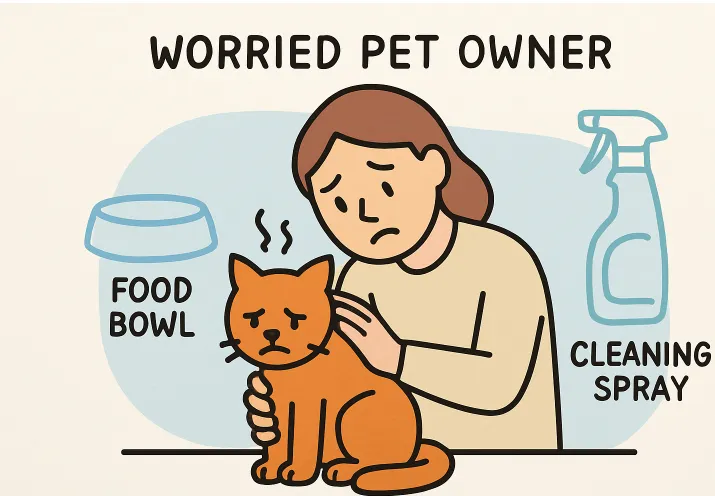What To Do If Your Pet Is Vomiting Or Has Diarrhea
When your beloved pet suddenly starts vomiting or experiencing diarrhea, it’s natural to feel alarmed and unsure of what steps to take. Pets can’t tell us exactly what’s wrong, so it’s important to understand the possible causes and how to respond effectively to help them feel better. From dietary issues to more serious illnesses, knowing what you should do can make a significant difference in your pet’s health and comfort. If your cat is frequently experiencing these issues, you may want to read more about cat vomiting to better understand the specific needs of feline companions. GASTASIENT gastrointestinal upset in pets can be mild or severe, requiring immediate veterinary attention. Basic knowledge helps make informed decisions and prevent future episodes. Regular home care, proper hygiene, and regular veterinary care are essential for good pet health management. This guide covers causes, warning signs, immediate home care, prevention strategies, and cleaning best practices for pet owners.
Also Read: 16 Minimalist Home Ideas That Redefine Simplicity and Style
Common Causes of Vomiting and Diarrhea in Pets
Many underlying elements can trigger gastrointestinal problems in dogs and cats. Dietary indiscretion—when pets eat inappropriate items such as spoiled food, garbage, or too many table scraps—is one of the most common reasons. It often leads to acute stomach upset but rarely causes lasting harm if managed properly. Another frequent culprit is intestinal parasites, which are especially dangerous for puppies, kittens, and outdoor animals. Parasites like roundworms, hookworms, or Giardia can cause persistent diarrhea, vomiting, and weight loss, and may be transmissible to other pets or humans. Keeping your pet’s environment clean and using regular deworming protocols can significantly reduce this risk.
Viral and bacterial infections must also be considered. Young pets are particularly susceptible to dangerous viruses such as parvovirus in puppies and panleukopenia in kittens. Bacterial infections, including Salmonella and Clostridium, can affect all ages and often require veterinary intervention and medications for proper treatment. For more on common pet stomach issues and their seriousness, the ASPCA offers detailed insights on symptoms and treatment options. Foreign body ingestion poses another significant hazard. Pets are naturally curious and may swallow toys, bones, or household objects, leading to obstructions and significant discomfort. Chronic conditions such as pancreatitis, kidney or liver disease, and inflammatory bowel disease can also express themselves through vomiting and diarrhea, with episodes often recurring over time.
When to Seek Veterinary Care
Not every case of vomiting or diarrhea requires a rush to the animal hospital, but prompt assessment is crucial when symptoms escalate. You should contact your veterinarian immediately if:
- Your pet has persistent vomiting or diarrhea lasting longer than 24 hours
- You see blood in the vomit or stool
- Your pet seems lethargic, weak, or collapses
- Symptoms of dehydration appear, such as dry or sticky gums, sunken eyes, or poor skin elasticity
- Your pet experiences abdominal pain, bloating, or appears distressed when touched
These signs could indicate a severe underlying problem, such as poisoning, obstruction, or infectious disease, requiring immediate professional attention for supportive and sometimes life-saving care. Consult reputable vet resources like the PetMD Emergency Guide for a comprehensive overview of symptoms that warrant professional intervention.
Also Read: McDonald and Son Funeral Home: A Trusted Name in Funeral Services
Immediate Steps to Take at Home
If your pet’s symptoms are mild, certain at-home measures may help stabilize their condition:
- Withhold Food Temporarily: Give your adult pet’s digestive system a rest by removing food for 12 hours (shorter for puppies or kittens). Monitor their demeanor throughout this period.
- Encourage Hydration: Always provide access to fresh, clean water—but avoid letting your pet gulp large amounts at once. You can offer ice chips if your pet struggles to keep water down.
- Bland Diet Reintroduction: After the fasting interval, feed small portions of an easily digestible meal, like boiled chicken and plain rice. Gradually return to regular feeding only after several symptom-free meals.
Never give your pet human medications unless advised by your veterinarian, as some common drugs can be highly toxic to animals.
Preventing Future Episodes
The best way to safeguard your pet’s health is through diligent prevention. Monitor their access to food—stick to high-quality pet diets, and avoid sharing human food, which may upset their digestive system or even prove toxic. Store medications, household cleaners, pest control supplies, and potentially dangerous plants well out of reach, as accidental ingestion is a leading cause of emergency vet visits. Routine veterinary care is also essential. Regular deworming, flea and tick prevention, and age-appropriate vaccinations help protect against parasites and disease. Consistent wellness checks allow your vet to identify and address emerging health issues before they become serious.
Also Read: Investing in Luxury Homes for Sale: A Smart Move for Future Wealth
Cleaning Up After Your Pet
Quick and thorough cleaning is vital to maintaining a healthy home and reducing the risk of infection or repeat soiling. For soft surfaces, carefully blot up as much of the mess as possible, then treat with a pet-safe enzyme cleaner to break down stains and odors. Let the solution sit for the recommended time before blotting dry and ventilating the area. Hard surfaces can be wiped clean, but be sure to disinfect with appropriate products that are non-toxic to animals. Proper hygiene, like handwashing after cleanup, is important for everyone’s safety.
Conclusion
Vomiting and diarrhea in pets can be distressing for both animals and owners, but prompt, informed action can make a big difference. Observing symptoms closely, knowing when to seek professional care, and following best practices for at-home support and prevention will help your pet recover and reduce the likelihood of future incidents. If you are ever in doubt, seeking guidance from your veterinarian is always the best course of action to ensure your pet’s health and happiness.


